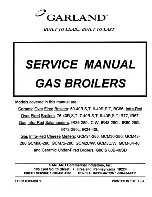
15.1 SERVICING
To ensure continued efficient operation of the appliance it
must be checked and serviced as necessary at regular
intervals. The frequency of servicing will depend upon the
particular installation conditions and usage, but once per
year should generally be adequate. The extent of the service
required by the appliance is determined by the operating
condition of the appliance when tested by fully qualified
engineers.
Any service work must be carried out by competent
engineers such as British Gas or Corgi registered personnel.
15. 2 PRE-SERVICE INSPECTION
Check that the flue terminal and the terminal guard, (if fitted), are clear.
If the appliance is in a compartment, check that any ventilation
openings in the compartment door or walls are clear. See Section
6 - Air Supply.
Check the system and remake any joints or fittings, if necessary,
which show signs of leakage. Refill, vent and re-pressurise as
described in Section 13.2.
Operate the appliance and the system taking note of any faults.
Measurement of the Flue Gases
For consistency of results of the flue gas measurements it is
necessary to have a constant output and stationary equilibrium.
Switch on the appliance.
Switch to DHW and CH mode.
Hinge down the facia.
Turn the Mode Switch to the “Max.” position.
Wait until the appliance reaches stationary equilibrium
(approx. 10 minutes).
Remove the cap from the sensing point. See Fig. 18.
Insert the probe into the measurement gap up to a depth of
50mm.
Seal any gaps.
Expected measurements should be between:
CO: 0.001 and 0.003%.
CO
2
: 6.7 and 7.0%.
After taking the measurement:
Replace the sealing cap.
Turn the Mode Switch back to the “normal” position.
Put the facia back in to its normal position.
SAFETY
Disconnect the electrical supply at the mains and turn off the
gas supply at the gas service cock on the appliance before
servicing.
After completing the service always test for gas soundness as
indicated in BS 6891.
15. 3 COMPONENT ACCESS
To carry out a full and comprehensive service of the appliance
remove the following parts to gain access to the components
which need to be checked or serviced.
(a) Cabinet Front Panel.
Remove by lifting off the supports.
(b) Inner Casing Cover.
Check that the electricity supply to the
appliance is turned off. Remove the cabinet front panel. Unscrew the
four screws securing the cover to the casing and lift off. See Fig. 26.
(c) Facia Panel.
Check that the electricity supply to the appliance
is turned off. Remove the cabinet front panel. Unscrew the two
upper screws as shown in Fig.12 and hinge down the facia
taking care not to distort the pressure gauge capillary tube or
electrical connections.
(d) Bottom panel.
Hinge down the facia panel. Disengage the
front edge of the bottom panel from the two clips and remove
the bottom panel from the appliance.
(e) Fan.
Remove the inner casing cover. Carefully unplug the
electrical connections and pull off the sensing tubes. Unscrew
the three fixing screws and remove the fan assembly. See Fig. 31.
(f) Flue Hood Assembly.
Remove the fan assembly. Undo the
two screws securing the flue hood. Lift and slide the flue hood
assembly from the appliance. See Fig. 31. When refitting the
hood ensure that the rear return edge passes under the lip at the
rear of the combustion chamber.
(g) Combustion Chamber Front and Sides.
Remove the inner
casing cover. Slacken off to the end of the thread but do not
remove the two wing nuts securing the combustion chamber.
Unhook the securing rods out of the locating holes in the
combustion chamber sides. Ease the combustion chamber front
and side assembly clear of the appliance. Refer to Fig. 31.
(h) Burner Assembly.
Remove the combustion chamber front
and sides. Pull off the two spark electrode leads and disconnect
the flame sense lead at the plastic connector under the inner
casing.
NOTE:
The flame sensing lead is attached to the burner.
When the burner is removed ensure this lead is fed through the
inner casing. Remove the grommet seal to allow the plastic
connection to pass through the inner casing. Unscrew the G
3
/
4
union nut on top of the gas valve and retain the sealing washer.
Unscrew the front burner fixing screw. Lift the burner and ease
the union nut through the inner casing sealing grommet.
Remove the burner assembly clear of the inner casing.
Ensure the flame sensing lead passes through the base of the
inner casing. See Fig. 31 and 32.
15. 4 SERVICE OF COMPONENTS
Clean the Fan.
Any dust or fluff should be removed with a soft
brush or by blowing. Take care not to distort the pressure
sensing device.
Clean the Main Burner.
Brush the blade tops and mixing tube
with a soft brush and check that all the flame ports are clear.
Remove any blockages with a non-metallic brush. Inspect the
injector and clean with a soft brush. Replace the injector if it
appears damaged. Do not use a wire brush or anything likely to
cause damage. Replace the spark and sense electrodes if they
appear damaged.
15. Inspection And Servicing
20
Fig. 31. Appliance components and fixings
(upper assembly).
Fan assembly
fixing screws (3)
Sensing tubes
(Red to +)
Flue hood
fixing
screws
Overheat
thermostat
Fan
assembly
Flue hood
Combustion
chamber
fixing bolts
(2)
Burner fixing screw
(35CDi
II
2 screws)
Combustion
chamber
front and
sides
Central
heating
sensor
+
-
Flue gas
sample
point
Summary of Contents for 24CDi
Page 28: ...28 109 ...
















































